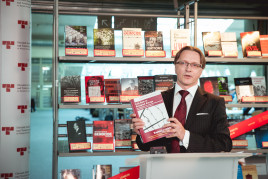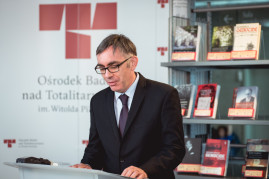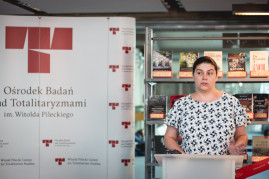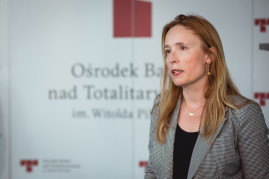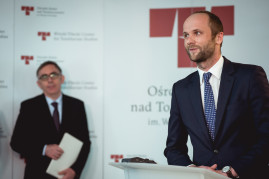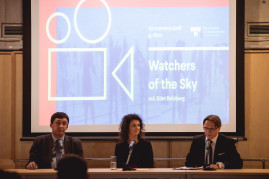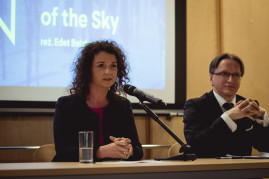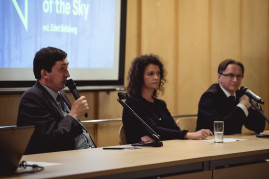The Opening of the Lemkin Collection - Instytut Pileckiego
The Opening of the Lemkin Collection
More than 160 books concerning the life and work of Rafał Lemkin were handed over to the Warsaw University Library. Compiled by the Center/Institute, the Lemkin Collection was today officially bequeathed and opened.
Rafał Lemkin coined the now universally-known term “genocide” and was the principal author of the draft of the Convention on the Prevention and Punishment of the Crime of Genocide, which was adopted by the General Assembly of the United Nations on 9 December 1948. Genocide – the abomination of humankind – was named and condemned only in the 20th century, this chiefly thanks to the dedication and tenacity of Rafał Lemkin.
Rafał Lemkin
Born in 1900, Lemkin was a Polish lawyer of Jewish ethnicity. Today his remarkable biography and work are widely recognized in scientific circles. The notion of genocide has been analyzed and interpreted by numerous philosophers, lawyers, historians, sociologists and psychologists, and continues to serve as a vital starting point for reflection in the international debate.
Lemkin graduated from the Jan Kazimierz University in Lwów, where he studied under the guidance of Professor Juliusz Makarewicz (the “father” of the Polish Penal Code). Lemkin’s Axis Rule in Occupied Europe, which was published in 1944, is a seminal work of genocide studies. It was in this book that he introduced the term “genocide” to denote the crime of purposeful destruction, in whole or in part, of national, ethnic, religious or racial groups.
Lemkin drew inspiration both from the Lwów School of Law and the unique Polish experience of confrontation with two totalitarian regimes. Under German and Soviet occupation, the Polish lands became the scene of the biggest mass crimes, including the Holocaust, which – in order to be effectively punished and prevented in the future – had to be defined anew in the postwar period. The reflection encapsulated in the sentence “why is the killing of a million a lesser crime than the killing of an individual?” led Lemkin to propose a new understanding of this type of atrocity. The result of his efforts was the Convention on the Prevention and Punishment of the Crime of Genocide, adopted by the UN in December 1948, a day before the Universal Declaration of Human Rights. Today, both these documents serve as the foundation of international law and order, which are grounded in the recognition of the rights of individuals and communities as universal values shared by all nations and states.
Lemkin was nominated for the Nobel Peace Prize a number of times. He died in 1959.
The Lemkin Collection
The first-ever collection of books relating to Rafał Lemkin and genocide studies. The set – unique in Poland and comprising both classic and more recent publications on the subject – numbers more than 160 titles from all over the world. In cooperation with the biggest university library in the country, the Center/Institute aims to make available books that, while of immense scholarly value, have been in the main inaccessible to both scholars and students.
This joint initiative of the Center/Institute and the Warsaw University Library is supported by three Warsaw-based law offices.
Watchers of the Sky – a special screening of a Sundance-awarded American documentary
The opening of the Lemkin Collection was accompanied by a special screening of Watchers of the Sky, a film directed by Edet Belzberg. In this American documentary devoted to Rafał Lemkin and the problem of genocide in today’s world, four human rights activists present the tragic history of 20th- and 21st-century genocide, discussing the Holocaust, the Armenian Genocide, the Great Famine in the Ukraine, the genocide against the Tutsi in Rwanda, and the War in Darfur, and also report on the international community’s reaction to these horrific crimes. They see Rafał Lemkin’s stance as a source of motivation for their work. The film won two awards at the Sundance Film Festival.
The screening was preceded by a short discussion with Professor Marek Kornat – a historian and Head of the Unit of the History of Diplomacy and Totalitarian Systems at the Institute of History of the Polish Academy of Sciences, and Dr. Agnieszka Bieńczyk-Missala – a political scientist, lecturer at the Institute of International Relations at the University of Warsaw, and author of numerous publications, including Międzynarodowa ochrona praw człowieka and Civilians in Contemporary Armed Conflicts.
PARTNER: Warsaw University Library





